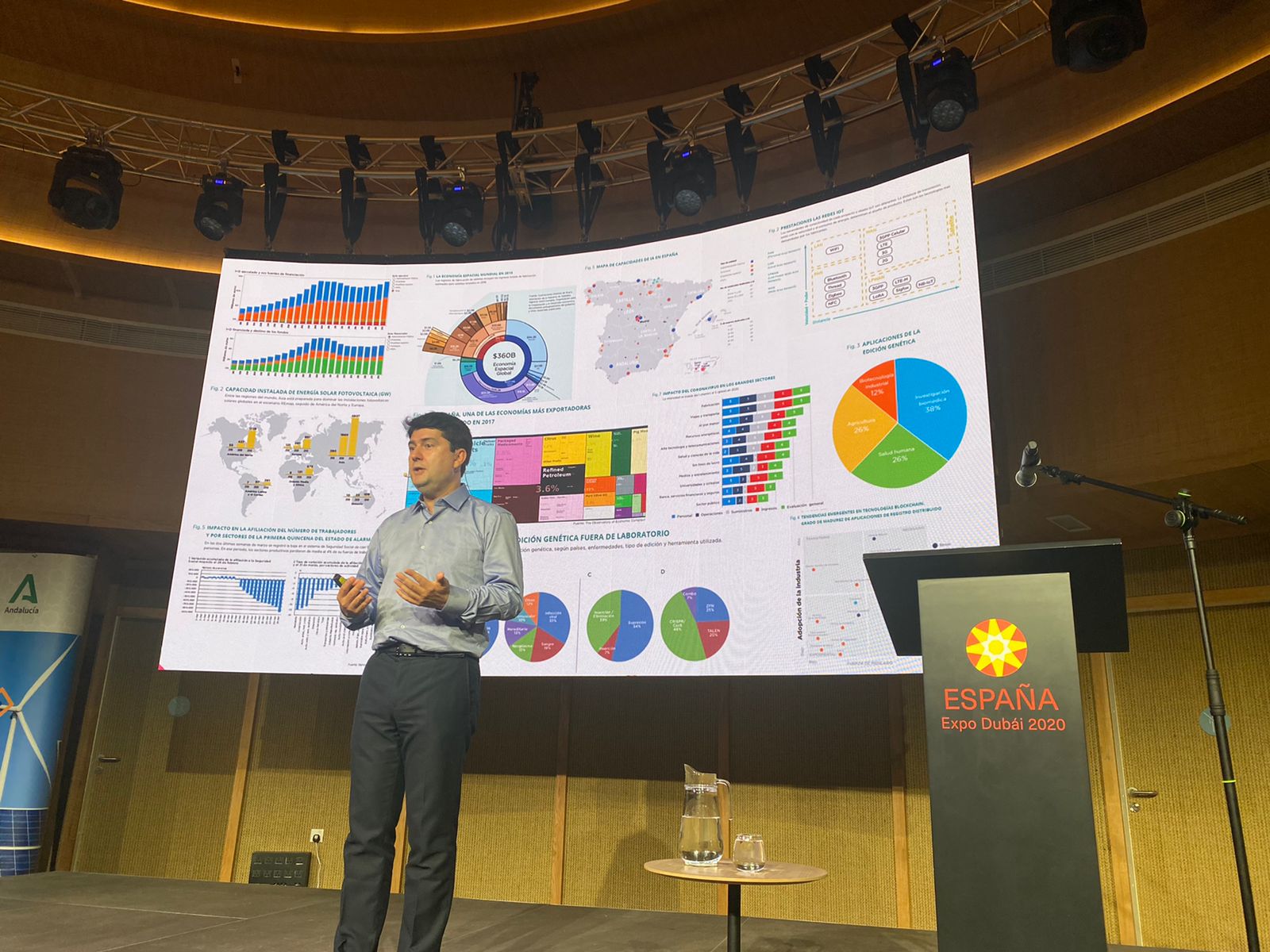
Javier García Martínez, professor at the Rafael del Pino Foundation, will present the report 10 technologies to boost Spain on 8 February at the Spain Pavilion at Expo 2020 in Dubai. Invited by the Association of Spanish Scientists and Researchers in the UAE (ACIEAU), the head of the Chair in Science and Society will present the key technologies to drive Spain towards economic recovery and avoid scientific dependence on foreign countries.
The report 10 technologies to boost Spain (INTEC 2021) is the second annual report produced by the Chair in Science and Society and has been published in book format by Gestión 2000 (Grupo Planeta) under the title España a Ciencia Cierta.
"Recent times have reminded us how important science is in solving the great problems of our time. We have witnessed how countries with solid scientific and technological structures have been able to produce the solutions while those that do not have been relegated to situations of dependence. In this context, from ACIEAU we wanted to invite a speaker of the highest level, the researcher and professor Javier García Martínez, to share with our members and with the Spanish innovation and science community in the United Arab Emirates, the details of the report he has coordinated, in the framework of the Chair of Science and Society of the Rafael del Pino Foundation, on key technologies and sectors to boost the economic recovery of Spain", explain the heads of the association of Spanish scientists.
The production system under scrutiny
The starting point of the report 10 technologies to boost Spain and of the book Spain for certain is an examination of the Spanish productive system, with its strengths and opportunities. The approach is based on the technological sectors and the changes in trends in the new ways of producing and consuming. The result is a decalogue that combines prospective analysis and scientific and technological rigour: telemedicine, photonics, new processes for the generation of hydrogen, neurosciences, mathematics for data processing, augmented reality, rapid tests, supercomputing, precision agriculture and nanomedicine.
The vision of Javier García and the team he leads is systemic and is part of the fourth industrial revolution. Each of the selected technologies has in itself the capacity to significantly improve the competitiveness of companies and move them towards a circular, more sustainable and resilient economy; but also more focused on people, their health and well-being. However, to reach their full potential, they need to be applied as a whole, as they support and complement each other.
European funds and quality employment
This approach makes Spain for Certain a reference work at a time marked by the necessary optimisation of European funds and the creation of quality employment. It also represents a solid contribution to guide decision-making in the face of the challenges Spain will face in the coming years.
"If we use European funds to buy technologies developed by others, we will never get out of the position of dependence and weakness that characterises our economy. If, on the other hand, we use these funds to develop and implement the technologies described here, we will be able to build the knowledge economy that will allow us to escape from the spiral of unemployment, precariousness and low competitiveness that have characterised our productive system for decades," says Javier García Martínez, professor and coordinator of the book.
"It is urgent to move from the 'Pact for Science' to the 'Plan for Science'. By now, no one disputes that science is important for the future of our country. Reaching a consensus on this point is easy. What is difficult is to build a shared and inspiring plan that moves people to action," adds the president of the International Union of Pure and Applied ChemistryPresident of the Young Academy of Spain and professor of inorganic chemistry at the University of Alicante.
Experts and equipment
To identify, select and explain the technologies in the report that gives rise to the book, a committee of experts made up of some of Spain's most reputable scientists and technologists has been involved in identifying, selecting and explaining them. The list covers very diverse areas and complementary profiles, from artificial intelligence to nanotechnology, from the energy sector to telecommunications. Their names: María José Alonso, Pablo Artal, María Blasco, Lina Gálvez, Laura Lechuga, Manuel de León, Susana Marcos, Ángela Nieto, Nuria Oliver, Andrés Pedreño, Héctor Perea and Javier Ventura-Traveset. The editorial team was led by Fernando Gomollón, PhD in organic chemistry and expert in science communication, and Eugenio Mallol, journalist, populariser and analyst.


